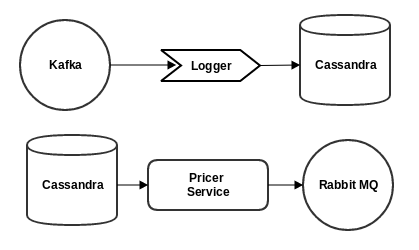Fs2 + Effects
Streaming applications
About me
- Functional Programmer
- Scala & Haskell
- Occasional writer at
- GitHub repo:
Effects
cats.effect.IO[A] A pure abstraction representing the intention to perform a side effect, where the result of that side effect may be obtained synchronously (via return) or asynchronously (via callback).
trait Effect[F[_]] extends Async[F]A monad that can suspend side effects into the `F` context and that supports lazy and potentially asynchronous evaluation.
Effects
f(println("hi"), println("hi"))val x = println("hi")
f(x, x)import cats.effect.IO
import scala.io.StdIn
val program = for {
_ <- IO { println("Please enter your name:") }
name <- IO { StdIn.readLine }
_ <- IO { println(s"Hi $name!") }
} yield ()
program.unsafeRunSync()"If replacing expression x by its value produces the same behavior, then x is referentially transparent"
def putStrLn(line: String) = IO { println(line) }val x = putStrLn("hi")f(x, x) == f(putStrLn("hi"), putStrLn("hi"))Fs2 concepts
Stream[F,O]It represents a discrete stream of O values which may request evaluation of F effects.
Pipe[F,I,O]= Stream[F,I] => Stream[F,O]Sink[F,I]= Pipe[F,I,Unit]Just a streaming transformation!
Its sole purpose is to run effects.
A bit of history
Process[F,O]F[A] = scalaz.Task[A]Case of Study

Order Generator
Pricer Service
Case of Study
Order Generator

Pricer Service
Case of Study
import cats.effect.IO
import com.gvolpe.fs2.streams.model._
import fs2.{Pipe, Sink, Stream}
import scala.concurrent.ExecutionContext
class PricerFlow() {
def flow(consumer: Stream[IO, Order],
logger: Sink[IO, Order],
storage: OrderStorage,
pricer: Pipe[IO, Order, Order],
publisher: Sink[IO, Order])
(implicit ec: ExecutionContext): Stream[IO, Unit] = {
Stream(
consumer observe logger to storage.write,
storage.read through pricer to publisher
).join(2)
}
}Pricer Service
Case of Study
class OrderGeneratorFlow()(implicit ec: ExecutionContext, R: Scheduler) {
private def defaultOrderGen: Pipe[IO, Int, Order] = { orderIds =>
val tickInterrupter = time.sleep[IO](11.seconds).map(_ => true)
val orderTick = time.awakeEvery[IO](2.seconds).interruptWhen(tickInterrupter)
(orderIds zip orderTick) flatMap { case (id, _) =>
val itemId = Random.nextInt(500).toLong
val itemPrice = Random.nextInt(10000).toDouble
val newOrder = Order(id.toLong, List(Item(itemId, s"laptop-$id", itemPrice)))
Stream.emit(newOrder)
}
}
def flow(source: Sink[IO, Order],
orderGen: Pipe[IO, Int, Order] = defaultOrderGen): Stream[IO, Unit] = {
Stream.range(1, 10).covary[IO] through orderGen to source
}
}Pricer Service
Case of Study
implicit val R = fs2.Scheduler.fromFixedDaemonPool(2, "generator-scheduler")
implicit val S = scala.concurrent.ExecutionContext.Implicits.global
val pricerProgram = for {
kafkaTopic <- Stream.eval(async.topic[IO, Order](Order.Empty))
rabbitQueue <- Stream.eval(async.boundedQueue[IO, Order](100))
dbQueue <- Stream.eval(async.boundedQueue[IO, Order](100))
kafkaBroker = new OrderKafkaBroker(kafkaTopic)
rabbitBroker = new OrderRabbitMqBroker(rabbitQueue)
db = new OrderDb(dbQueue)
pricerFlow = new PricerFlow().flow(kafkaBroker.consume, logger,
OrderStorage(db.read, db.persist),
pricer, rabbitBroker.produce)
orderGenFlow = new OrderGeneratorFlow().flow(kafkaBroker.produce)
program <- pricerFlow mergeHaltBoth orderGenFlow
} yield program
pricerProgram.run.unsafeRunSync()Pricer Service
Case of Study
protected def acquireConnection[F[_] : Effect]: F[(Connection, Channel)] =
Effect[F].delay {
val conn = factory.newConnection
val channel = conn.createChannel
(conn, channel)
}
/**
* Creates a connection and a channel in a safe way using Stream.bracket.
* In case of failure, the resources will be cleaned up properly.
*
* @return An effectful [[fs2.Stream]] of type [[Channel]]
* */
def createConnectionChannel[F[_] : Effect](): Stream[F, Channel] =
Stream.bracket(acquireConnection)(
cc => asyncF[F, Channel](cc._2),
cc => Effect[F].delay {
val (conn, channel) = cc
log.info(s"Releasing connection: $conn previously acquired.")
if (channel.isOpen) channel.close()
if (conn.isOpen) conn.close()
}
)Fs2 Rabbit library
Case of Study
def jsonEncode[F[_] : Effect, A : Encoder]: Pipe[F, AmqpMessage[A], AmqpMessage[String]] =
streamMsg =>
for {
amqpMsg <- streamMsg
json <- asyncF[F, String](amqpMsg.payload.asJson.noSpaces)
} yield AmqpMessage(json, amqpMsg.properties)
private val log = LoggerFactory.getLogger(getClass)
def jsonDecode[F[_] : Effect, A : Decoder]:
Pipe[F, AmqpEnvelope, (Either[Error, A], DeliveryTag)] =
streamMsg =>
for {
amqpMsg <- streamMsg
parsed <- asyncF[F, Either[Error, A]](decode[A](amqpMsg.payload))
_ <- asyncF[F, Unit](log.debug(s"Parsed: $parsed"))
} yield (parsed, amqpMsg.deliveryTag)
// asyncF(body) is an alias for Stream.eval(F.delay(body))Fs2 Rabbit library
Comparison
Monix vs Akka Stream vs Fs2
Resources
Questions?
Fs2 + Effects
By Gabriel Volpe
Fs2 + Effects
- 3,507



